Research and Data
In 2023, the Urban Libraries Council launched a renewed focus on our ability to do research, conduct data analysis and create data visualizations about urban libraries. In order to lay the groundwork for the future of public libraries, we must know where we currently are. ULC will use this expanded focus on data-driven solutions development to align technical assistance, develop member programming, and create original research products.
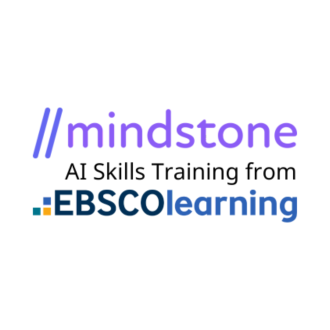
AI Fluency for Everyday Impact: Mindstone AI Skills Training from EBSCOlearning
The future of libraries is here—and it’s powered by AI! In partnership with EBSCO, ULC is thrilled to offer members the Mindstone AI Skills Training program. Designed for non-technical employees, this innovative online series provides practical AI tools to streamline workflows, boost productivity, and drive workplace innovation.
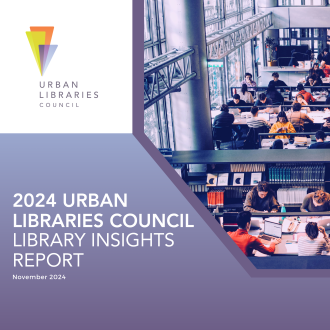
ULC's Annual Library Insights Survey & Report
The annual Library Insights Survey (LIS) collects information from member libraries on their budgets, staffing, operations, visitors and programs to help strengthen and advance the essential role of public libraries in our cities. These data snapshots and more are analyzed in the 2024 Library Insights Report. Access information and data visualizations of emerging trends that capture current patron engagement with library programs, access to services and the building space itself.
AI Research Partnership with CTGAlbany
ULC and the University at Albany’s Center for Technology in Government (CTG UAlbany) are partnering to examine how libraries can empower communities to better understand Artificial Intelligence and ensure its ethical design and application. This three-year research project, funded through a grant from the Institute for Museum and Library Services, will include surveys and interviews with ULC member libraries, case studies, a comprehensive report and a practitioners’ guide for libraries.

ULC and Placer.ai
ULC is thrilled to announce an exciting and new partnership with Placer.ai, a location analytics technology company. With Placer.ai, ULC members can get a discounted subscription to a best-in-class software solution that uses foot traffic data to help library leaders implement stronger impact evaluation practices. We will also use Placer.ai to inform new research to make the case that libraries are driving visits to downtown areas and are an economic driver for cities.
ULC Library Data Hive
The ULC Data Hive displays the data collected from the Library Insights Survey — as well as publicly available demographic information — in interactive dashboards, charts and maps. The Library Data Hive is available only to ULC members.
Research Publications
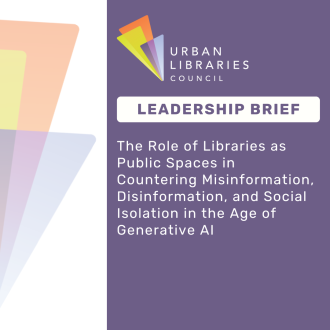
The Role of Libraries as Public Spaces in Countering Misinformation, Disinformation, and Social Isolation in the Age of Generative AI
The rise of artificial intelligence, especially generative AI, has dramatically increased the prevalence of misinformation and disinformation in our daily lives. At the same time, social isolation continues to be a concerning issue facing our communities. This report from the Urban Libraries Council explores how libraries are tackling misinformation, disinformation, and social isolation in the age of generative AI. Learn how libraries can promote digital literacy and foster social connections to strengthen communities.
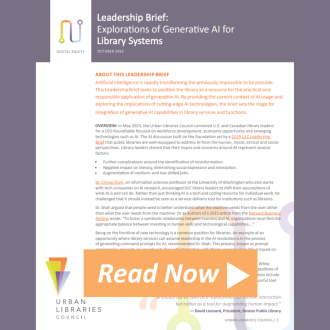
Explorations of Generative AI for Library Systems
Leadership Brief
This Leadership Brief outlines five ways libraries can integrate cutting-edge artificial intelligence in their work. From leveraging prompt engineering skills of staff members to using AI to advance information literacy, libraries should be preparing for a swift integration of AI across library services, resources and operations.
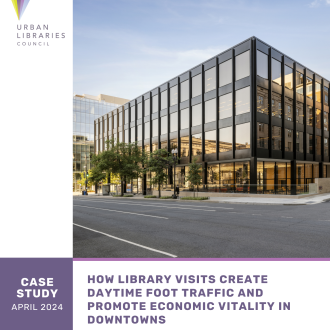
How Library Visits Create Daytime Foot Traffic and Promote Economic Vitality in Downtowns
Case Study: DC Public Library
How are libraries recovering from the COVID-19 pandemic? This is a big question that frequently guides the research conducted by the Urban Libraries Council. While libraries with a downtown location historically contribute a significant amount of steady foot traffic and daytime population and serve as trip attractions, has that been happening since the pandemic? ULC is sharing some of our preliminary research around the connection between public libraries and economic vitality in a new case study about what is happening at the DC Public Library, and its impact on Downtown DC foot traffic.
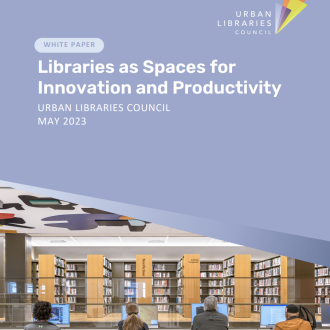
Libraries as Spaces of Innovation and Productivity
White Paper
ULC's white paper, Libraries as Spaces for Innovation and Productivity, explores the importance of congregation in a post-pandemic world, particularly the role of libraries as reliable structures, attractions, and prime choices for visits even as we experience a great upheaval of spaces in which people prioritize spending time.
